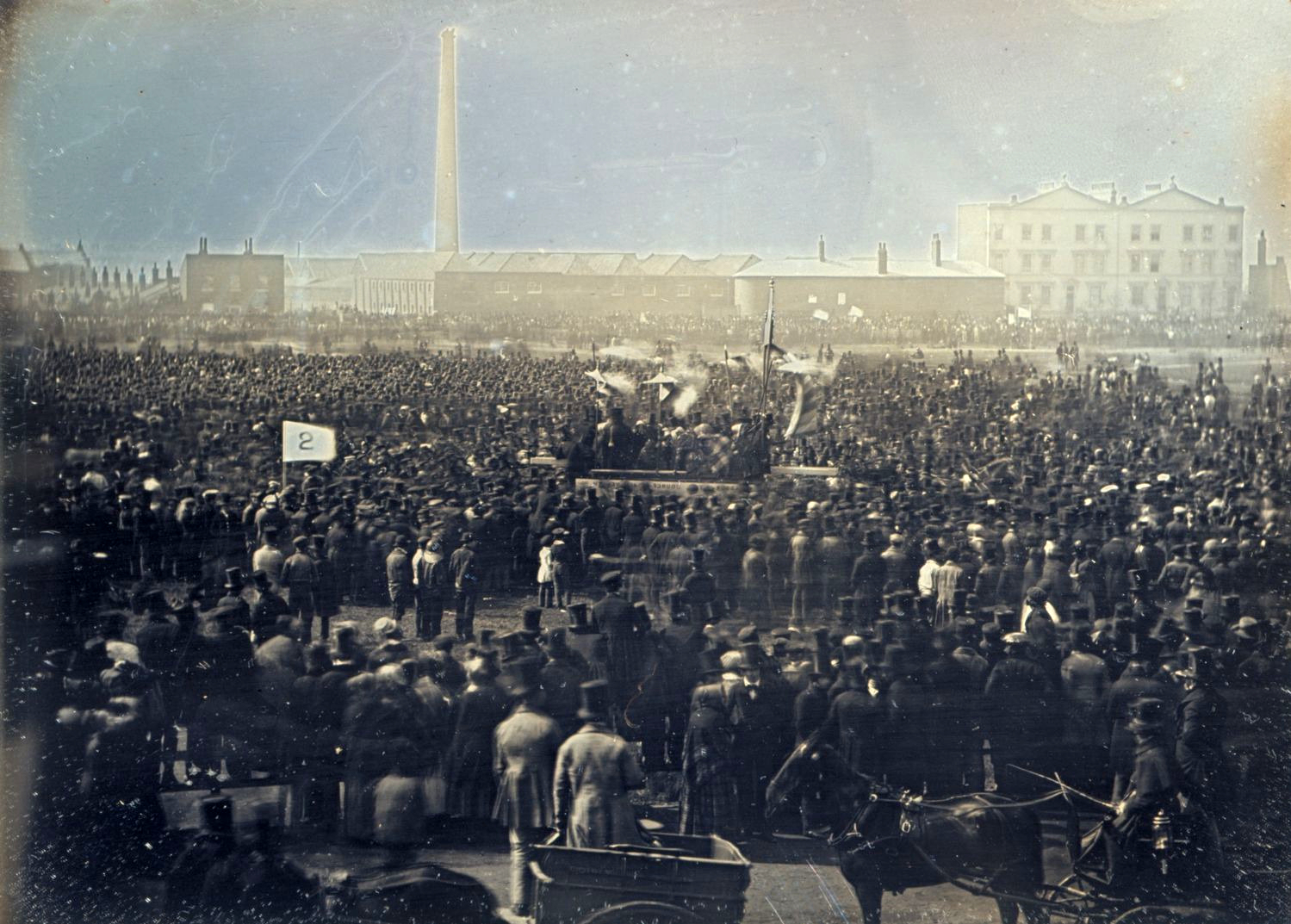 |
| The Great Chartist Meeting on Kennington Common, 10 April 1848. |
 |
| Protesters march on Avenue Habib Bourguiba in downtown Tunis, 14 Jan 2011. |
This is not the first time the world has seen such waves of protests against bad governments by the people calling for greater civil and political rights. In 1848 a wave of popular protests and revolutions swept through Europe effecting almost every country on the continent. The only countries that did not experience a revolution during this period were the United Kingdom, Netherlands, Ottoman Empire, and the Russian Empire. The United Kingdom and the Netherlands already had popular revolutions in the 17th century (the UK had the Glorious Revolution whist the Netherlands fought a bitter war with the Spanish Empire to declare its self a republic followed by the Batavian Revolution) and were on the road to expanding their peoples liberties whist both the Ottoman Empire and the Russian Empire would have to wait another 60 or so years before they would experience revolutions of their own. The Ottoman Empire's revolution lead by Attaturk would transform what was left of the Ottoman Empire into modern day Turkey. The Russian Empire experienced many revolts before the successful October Revolution and very brutal Russian civil war transformed the empire into the Soviet Union.
In many ways Europe before 1848, much like the Arab World today, was ripe for popular protests and a change of government. An popular press expanding and extending political awareness amongst the people of industrializing Europe. Similar in effect to the emergence of Al Jazeera and other Arab satellite channels in addition to the introduction of the internet in the Arab World today. Europe at the time had also been experiencing a series of economic downturns and rising food prices. Also similar to the stagnant economies, high unemployment, and rising food prices in the Arab World today. All of this leading to increasing levels of poverty amongst the working poor. The spread of modern ideologies, most notably liberalism, in pre-1848 Europe also contributed greatly to the revolutions as people were presented with new ideas of how they should be governed and what rights they were or should be entitled to. Again, this is similar to the spread of liberal and other modern ideologies coming from the West through the process of globalisation in the Arab World today.
On this note of shared revolutionary experiences in both the Europe of 1848 and the Middle East & North Africa of today that I recommend the following book by Mike Rapport on the revolutions of 1848. It will be of great interest to anyone with a strong interest in this sort of popular wave revolutions.
1848: Year of Revolution, by Mike Rapport, Basic Books, 2009. Purchase at B&N.com | Purchase at Amazon.com
Since I have not finished reading my copy yet here is a review by Gilbert Taylor from Booklist:
In this account of a turbulent year in which most European thrones were shaken or toppled, Rapport smoothly blends drama of battles on the barricades and perspective on the causes and consequences. As ever in revolution, severe economic distress of workers dovetailed with protest by liberals and radicals to ignite a political explosion, initially in Italy but contagiously in France. Rapport’s telling of the February Revolution in Paris, and of ensuing popular revolts in Prussia, the Hapsburg Empire, and the Italian states, periodically pauses for his keen observations about disagreements within the temporarily triumphant revolutionary camps. After the political revolutions, discord between liberals hoping to establish constitutional order and radicals fomenting social revolution gave conservatives and reactionaries openings to mount counterrevolutions. Such are the political labels of the contending forces, but Rapport’s emphasis on leaders installed in the history books about 1848—including Mazzini, Kossuth, Bismarck, and Marx—reminds readers of the force these key individuals exerted on the course of events. Striking an excellent balance between narrative and explanation, Rapport will engage the history audience. --Gilbert Taylor --This text refers to the Hardcover edition.
Al Jazeera's daily blog on the situation in Libia: http://blogs.aljazeera.net/node/4621/middle-east/2011/02/17/live-blog-libya#feb17

No comments:
Post a Comment